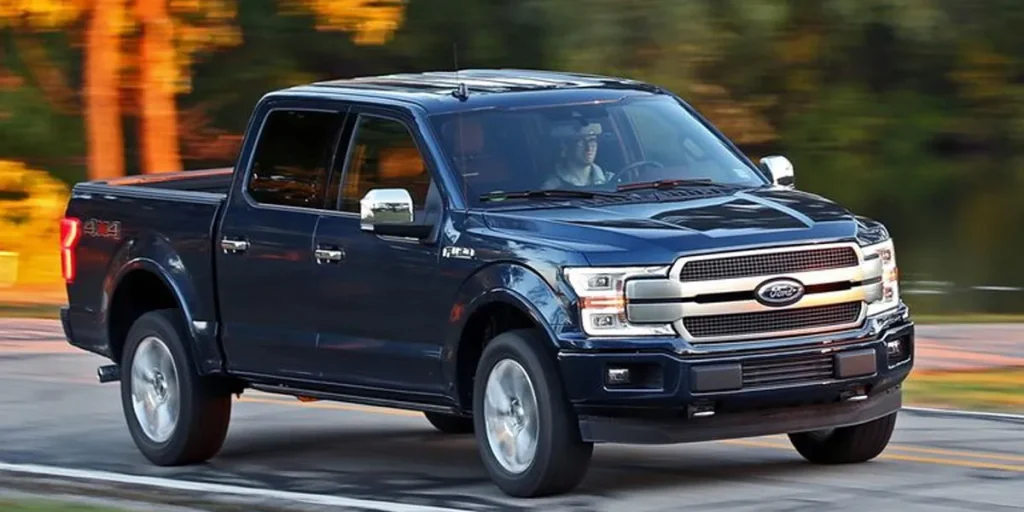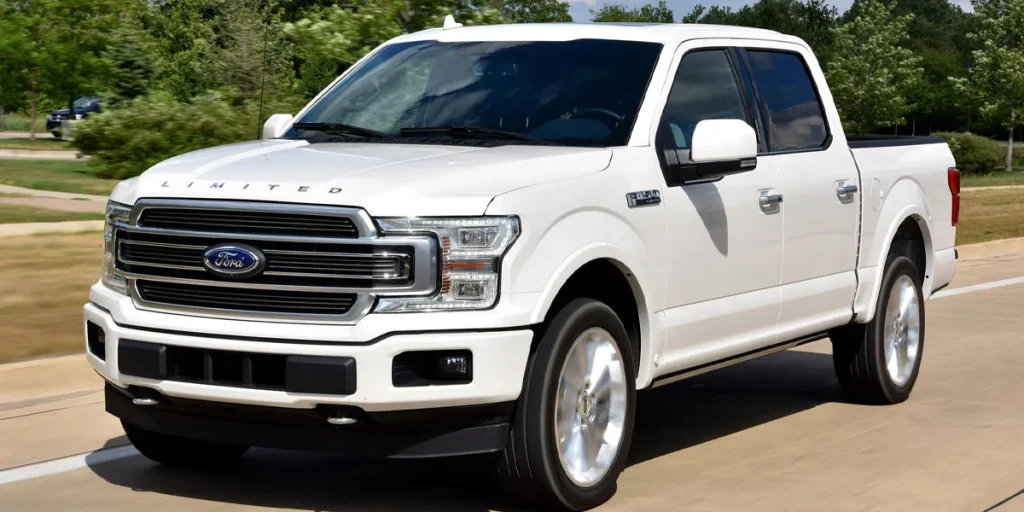A 2018 Ford F150 weighs between 4,069 to 5,697 pounds. The truck’s weight varies based on the model, configuration, and engine type.
The Ford F150, a part of the revered F-Series trucks, has set high standards in the pickup truck segment for decades.
Known for its robustness and versatility, the 2018 F150 comes in a range of trims and specifications, each contributing to the fluctuation in its curb weight.
Truck enthusiasts and potential purchasers often weigh the importance of this factor as it can impact fuel efficiency, towing capacity, and overall vehicle performance.
The lightweight military-grade aluminum construction introduced in recent F150 models underscores Ford’s commitment to efficiency without compromising on durability or capability.
Whether you’re in the market for a dependable workhorse or a family-friendly hauler, the F150’s weight is an essential consideration that reflects its engineered mix of strength and innovation.
Importance Of Knowing Your Truck’s Weight

Knowing your truck’s weight plays a critical role in ensuring safety and optimizing performance.
For 2018 F-150 owners, understanding the weight of their vehicle can influence various aspects from legal compliance to daily operation.
Safety Considerations
Ensuring the safety of both the driver and others on the road is a top priority. Knowing the weight of a truck helps in:
- Assessing brake system efficiency.
- Calculating stopping distances accurately.
- Understanding vehicle stability and handling constraints.
Weight directly impacts how a vehicle responds in emergency situations. Oversized loads can lead to brake failure or loss of control, posing a risk to everyone nearby.
Vehicle Performance
Performance of a truck can significantly vary with its weight. The weight of a truck affects:
- Fuel consumption.
- Acceleration and speed capabilities.
- Wear and tear on tires and suspension systems.
Drivers aiming for efficiency should stay informed about their truck’s weight. Exceeding weight limits can lead to increased maintenance costs and decreased longevity of the truck.
Variations In The 2018 F150 Models
Exploring the diverse range of the 2018 F150 highlights Ford’s commitment to providing options for every truck enthusiast.
Whether it’s a base model for everyday tasks or a high-end trim for luxury and performance, the weight of each F150 varies significantly.
These differences stem from the distinct trims, cabin configurations, engine sizes, and installed options.
Different Trims And Options
The 2018 F150 comes in various trims, from the work-ready XL to the plush Limited. Each trim level offers unique features that cater to different needs and desires.
Whether choosing the off-road-ready Raptor or the luxurious Platinum, options like bed sizes, 4×4 drivetrains, and engine choices further personalize the pickup truck.
- XL: Basic work truck, minimal features
- XLT: Adds more comfort features
- Lariat: Upscale interior, technology upgrade
- King Ranch: Western theme, premium materials
- Platinum: Advanced features, elegant design
- Limited: Top-tier luxury, all bells and whistles
- Raptor: Off-road capabilities, sporty look
Impact On Weight
The chosen trim level and added options directly affect the 2018 F150’s weight.
Heavier materials in luxury trims add pounds, while more robust engines and 4-wheel drive systems bring additional weight.
Even the choice of steel or aluminum wheels can impact the final numbers on the scale.
| Trim | Engine | Drivetrain | Weight |
|---|---|---|---|
| XL | V6 | RWD | 4,069 lbs |
| XLT | V8 | RWD | 4,443 lbs |
| Lariat | EcoBoost | 4WD | 4,653 lbs |
| Platinum | V8 | 4WD | 4,903 lbs |
| Limited | EcoBoost | 4WD | 5,078 lbs |
| Raptor | High-Output EcoBoost | 4WD | 5,525 lbs |
Each configuration has a unique curb weight. The selection process, thus, demands careful attention to detail.
It influences not only performance but also efficiency and payload capacity. As a prospective buyer or enthusiast, understanding these weight variations is crucial for making an informed choice.
Standard Weights For The 2018 F150

Truck lovers often ask about the Standard Weights for the 2018 F150. Knowing this helps with understanding towing and payload capacity.
The 2018 Ford F150 comes in various models, each with different weights. Let’s explore the base model specifications first.
Base Model Specifications
The 2018 F150 base model, known as the XL, has specific weights. The regular cab starts light, making it easier on fuel.
It is made for efficiency and basic hauling needs. Here are some key specs:
- Curb Weight: Around 4,069 to 4,653 lbs
- Gross Vehicle Weight Rating (GVWR): 6,100 to 6,280 lbs
- Engine: 3.3L V6
- Drivetrain: Available in both 4×2 and 4×4
Different engines and trims will alter these numbers. Items like 4×4 drivetrains add weight.
Supercab Vs Supercrew
Choosing between SuperCab and SuperCrew affects the truck’s weight. SuperCab models offer extra space behind the front seats for passengers or cargo.
SuperCrew models have a full-sized rear seat area, which increases the weight. Here’s a comparison:
| Model | Curb Weight | GVWR |
|---|---|---|
| SuperCab | 4,415 to 5,236 lbs | 6,300 to 7,050 lbs |
| SuperCrew | 4,529 to 5,697 lbs | 6,500 to 7,600 lbs |
Remember, adding options like 4WD can change these weights. Always check the specific model for exact numbers.
Factors Contributing To The F150’s Weight
Understanding the diverse elements determining a vehicle’s mass is fundamental when analyzing the 2018 F150’s weight.
Unsurprisingly, Ford’s quintessential truck has a weight that varies widely across models and trims. Let’s delve into the primary factors.
Material Use
The construction materials of the F150 play a major role in its total weight. Ford’s strategic use of aluminum alloy in the body and high-strength steel in the frame culminated in a lighter yet durable truck.
Material choice directly impacts weight, providing a balance between efficiency and capability.
Engine Type And Size
Different engine configurations influence the overall weight of the F150. Options range from the efficient 2.7L EcoBoost to the powerful 5.0L V8.
Each engine comes with varying components and materials that add or subtract from the truck’s weight. Here’s a breakdown of engine types and their influence on weight:
- 2.7L EcoBoost: Lighter, efficient, reduces weight
- 3.5L EcoBoost: Balances power and weight
- 5.0L V8: Heavier, adds robustness to truck
Comparing The F150’s Weight To Other Trucks
When thinking about buying a truck, size matters. The 2018 F150’s weight plays a huge role in its performance. Let’s see how the F150 measures up to its rivals.
Discover the differences that could make or break your decision.
Competitor Analysis
Ford’s F150 stands as a popular choice. But what about other trucks? Compare the weights for a fair picture. Look at Chevrolet Silverado, Ram 1500, and Toyota Tundra.
- Chevrolet Silverado – Typically heavier, it offers a robust frame.
- Ram 1500 – Comes close, focusing on a balance of weight and power.
- Toyota Tundra – Often lighter, aiming for fuel efficiency.
Industry Averages
F150 fits well within industry standards. Its weight reflects the careful blend of durability and agility. Here’s a quick overview of truck weights:
| Truck | Average Weight (lbs) |
|---|---|
| 2018 Ford F150 | 4,069 – 5,697 |
| Chevrolet Silverado 1500 | 4,515 – 5,300 |
| Ram 1500 | 4,798 – 5,372 |
| Toyota Tundra | 5,170 – 5,670 |
The F150’s range offers flexibility for various needs. It competes squarely with industry favorites. This makes the F150 a strong contender in its class.
Maximizing Your F150’s Performance
Knowing your 2018 F150’s weight is key to unlocking its performance potential. Let’s dive in to maximize your F150’s capabilities with careful attention to maintenance and strategic enhancements.
Proper Maintenance Routines
Keep your F150 running like a champ with regular tune-ups. Stick to a schedule for oil changes, tire rotations, and brake inspections.
Remember, a well-maintained truck equals top-notch performance.
- Check fluids monthly – oil, coolant, and brake fluid.
- Replace air filters every 12,000 miles.
- Inspect tires for even wear and proper pressure.
Upgrades And Modifications
Transform your F150 with smart upgrades. Whether it’s boosting horsepower or enhancing handling, choose mods that match your performance goals.
| Upgrade | Benefit |
|---|---|
| Cold Air Intake | Improves airflow and response |
| Performance Chip | Tweaks engine for better fuel efficiency and power |
| Exhaust System | Boosts horsepower and creates a mean sound |
Remember: each modification should comply with your F150’s weight and specs. Consult with experts before making changes.
FAQ About the Weight of A 2018 F150
What Is The Curb Weight Of A 2018 F150?
The curb weight of a 2018 Ford F150 ranges from approximately 4,069 to 5,697 pounds.
This variation is due to different trims and configurations available.
Does Engine Type Affect A 2018 F150’s Weight?
Yes, the engine type can affect a 2018 F150’s weight. Models equipped with larger engines typically weigh more than those with standard or smaller engines due to the added material.
How Does Cab Size Impact 2018 F150 Weight?
The cab size significantly impacts the weight of a 2018 F150. For instance, a Regular Cab generally weighs less than a SuperCrew Cab, which is the largest option and adds more weight.
Are 2018 F150 4×4 Models Heavier Than 4×2?
Indeed, 2018 F150 4×4 models are heavier than 4×2 versions. The additional four-wheel-drive hardware contributes to the overall increase in weight.
Conclusion
Understanding the weight of a 2018 F150 is crucial for owners and potential buyers alike. Each trim level offers varying weights, impacting payload, towing capacity, and performance.
Always check the specific model details to ensure accuracy for your needs. Safe driving starts with knowing your vehicle’s specifications – the 2018 F150 is no exception.
Resources:
https://www.ford.com/support/vehicle/f150/2019/
https://www.nhtsa.gov/vehicle/2019/FORD/F-150%20REGULAR%20CAB/PU/RC/4×2
